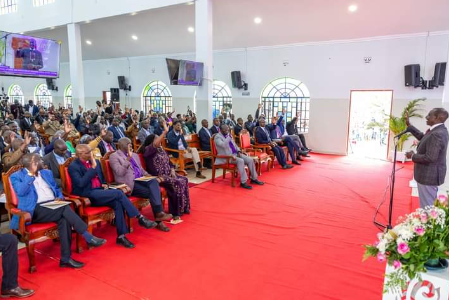President William Ruto has assured religious leaders that both public and state officers will continue to support the construction of churches and places of worship, despite the recent ban on harambees (fundraising events). He stated that this support will now be provided under a new structure and in compliance with the law.
“Kazi ya ujenzi wa kanisa itaendelea, kazi ya ujenzi wa nyumba ya maombi itaendelea na wananchi wote watajumuishwa katika kazi hiyo. Wale wako serikali hawatashiriki moja kwa moja (The construction of places of worship will continue and all Kenyans are going to be involved),” he said.
Speaking during a church service at Chebango in Sotik, Bomet, the Head of State noted that there is currently legislation in Parliament that will guide how such fundraisers are conducted.
This, he said, is to ensure that all officers remain transparent and accountable.
Once approved, Ruto said they will no longer participate directly in such fundraisers.
“There will be public participation and Kenyans will have an opportunity to give their views on that piece of legislation on how we are going to do that work in a way that we respect God and humans,” he stated.
On July 5, the President announced that no state officer would be allowed to participate in fundraising activities henceforth.
He also directed the state officers to keep off philanthropic activities.
“The Attorney General is hereby directed to prepare and submit legislation to this effect and develop a mechanism for structured and transparent contribution for public, charitable and philanthropic purposes,” Ruto said.
In a memo dated July 7, Head of Public Service Felix Koskei reiterated that whilst the spirit of Harambee continues to propel its noble ideal of nation-building, the same has come into disrepute through perceptions of corruption and abuse of office.
“In that regard, it is notified that His Excellency the President has directed that ‘No State officer and public servant shall participate in public collections (Harambees) henceforth,” he said.
“Accordingly, all public officers are required to adhere to the highest standards of ethical conduct and to secure their strict compliance with the directive as well as compliance by all officers under their supervision, direction, or control.”
Koskei noted that this was in line with upholding the national principles and values of governance as enshrined in Article 10 of the Constitution and various laws, including the Public Officers Ethics Act, the Public Service Commission Code of Conduct and Ethics, and the Public Collections Act.
The memo was copied to all state officers including clerks of assemblies, governors, AG, cabinet secretaries and PSs, DPP, auditor general, controller of budget, chief registrar of Judiciary and chairpersons and CEOs of state corporations and constitutional commissions.



